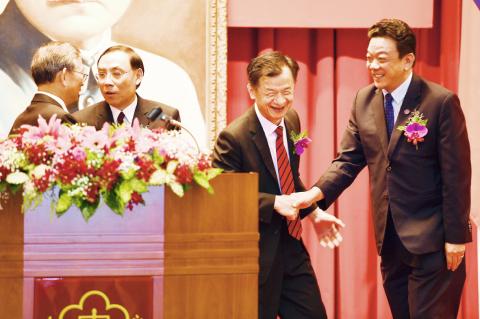Minister of Justice Tsai Ching-hsiang (蔡清祥), who was sworn into office yesterday, refused to give definitive comments about whether the ministry would lift an unofficial suspension on carrying out death sentences.
Tsai said he has been in office for less than a day and needs to thoroughly consider the facts and weigh public opinion carefully before making a decision.
Tsai said his experience as Investigation Bureau director-general gives him a greater understanding of the proper integration of criminal investigation and prosecution.

Photo: George Tsorng, Taipei Times
He is the first person to move from the bureau position to minister of justice.
At his swearing-in ceremony, Tsai said he hopes members of the ministry will be motivated in their work by idealism, a sense of mission and passion.
The five subordinate services of prosecutors, investigators, anti-corruption officers, administrative enforcement agents and corrections officers must coordinate their actions and resources in the war on crime, drugs, telecom fraud and electoral fraud, he said.
Separately yesterday, Minister of the Interior Hsu Kuo-yung (徐國勇) said his appointment to the post is not related to the nine-in-one elections in November.
The Ministry of the Interior is to focus on the tasks of urban renewal and social housing, as well as narcotics enforcement and public safety, to ensure an orderly and safe society, Hsu said.
“I come to the ministry on my own because I feel total confidence in the people of this ministry and have no need to bring staff,” he said.
Elsewhere, Agriculture and Food Agency Director-General Hu Zhong-yi (胡忠一) vowed to balance the production and sale of domestic crops and increase collaboration with farmers’ groups.
As the agency has been plagued by plunging prices due to oversupply, balancing crop production and supply is expected to be a challenge.
At the handover ceremony at the agency’s main office in Nantou County’s Jhongsing New Village (中興新村), Hu said he would promote new agriculture models and turn domestic agriculture into “a technological, secure, profitable and sustainable industry.”
Hu presented eight plans to boost the competitiveness of domestic agriculture, including improving information systems for crop supply and demand; reviewing the nation’s tariff quotas for crops; seeking diverse ways to process crops; and setting up more cooling and logistics systems to reduce the loss of crops during delivery.
Also, he plans to help farmers replace less competitive crops or ones in oversupply with others; encourage more farmers to adopt organic and eco-friendly farming and join the council’s traceability agricultural product system; establish a strategic alliance among the agency, local farmers’ groups and other marketing channels; and adjust the market structure of agricultural products.

CAUTION: Based on intelligence from the nation’s security agencies, MOFA has cautioned Taiwanese travelers about heightened safety risks in China-friendly countries The Ministry of Foreign Affairs (MOFA) yesterday urged Taiwanese to be aware of their safety when traveling abroad, especially in countries that are friendly to China. China in June last year issued 22 guidelines that allow its courts to try in absentia and sentence to death so-called “diehard” Taiwanese independence activists, even though Chinese courts have no jurisdiction in Taiwan. Late last month, a senior Chinese official gave closed-door instructions to state security units to implement the guidelines in countries friendly to China, a government memo and a senior Taiwan security official said, based on information gathered by Taiwan’s intelligence agency. The

The National Immigration Agency (NIA) said yesterday that it will revoke the dependent-based residence permit of a Chinese social media influencer who reportedly “openly advocated for [China’s] unification through military force” with Taiwan. The Chinese national, identified by her surname Liu (劉), will have her residence permit revoked in accordance with Article 14 of the “Measures for the permission of family- based residence, long-term residence and settlement of people from the Mainland Area in the Taiwan Area,” the NIA said in a news release. The agency explained it received reports that Liu made “unifying Taiwan through military force” statements on her online

Taiwan Semiconductor Manufacturing Co (TSMC), the world’s largest contract chipmaker, said yesterday that it is looking to hire 8,000 people this year, at a time when the tech giant is expanding production capacity to maintain its lead over competitors. To attract talent, TSMC would launch a large-scale recruitment campaign on campuses across Taiwan, where a newly recruited engineer with a master’s degree could expect to receive an average salary of NT$2.2 million (US$60,912), which is much higher than the 2023 national average of NT$709,000 for those in the same category, according to government statistics. TSMC, which accounted for more than 60 percent

Tung Tzu-hsien (童子賢), a Taiwanese businessman and deputy convener of the nation’s National Climate Change Committee, said yesterday that “electrical power is national power” and nuclear energy is “very important to Taiwan.” Tung made the remarks, suggesting that his views do not align with the country’s current official policy of phasing out nuclear energy, at a forum organized by the Taiwan People’s Party titled “Challenges and Prospects of Taiwan’s AI Industry and Energy Policy.” “Taiwan is currently pursuing industries with high added- value and is developing vigorously, and this all requires electricity,” said the chairman